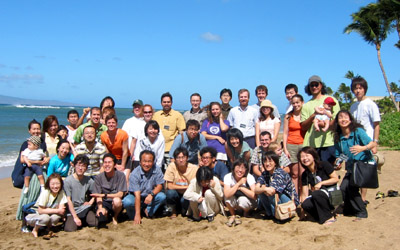| RIKEN Center for Developmental Biology
(CDB) 2-2-3 Minatojima minamimachi, Chuo-ku, Kobe 650-0047, Japan |
December 23, 2003 – Members of the Laboratory for Evolutionary Regeneration (Kiyokazu Agata, Group Director) met with colleagues from the Universities of Utah, Illinois and Chicago last month to kick off a collaborative project in the genomic annotation of a species of planarian flatworm, Schmidtea mediterranea. The labs converged on the island of Maui for the first Japan-US Planarian Meeting (November 7-14), through the support of a Mitsubishi Research Grant in the Natural Sciences. The meeting was convened to determine long-term work assignments and begin actual annotation of planarian cDNAs, a process that involves the mapping of expressed sequence tags (ESTs) to their chromosomal locations. ESTs (cDNA fragments complementary to mRNAs) serve as markers of genomic coding domains and are commonly used in prospecting for new genes. The cDNA annotation was performed using ESTs from a related species of planarian, Dugesia japonica. During the seven-day meeting, work was divided up by country and function, with members from the Japanese and American labs collaborating to combine and sort the ESTs by category, such as genes thought to act as transcription factors or in the planarian nervous system. Key genes were then identified in each category and annotated to establish their locations and characteristics. The sequencing and annotation of the planarian genome promises to provide an invaluable resource for the study of evolutionary biology, comparative genomics, and the genetics underlying the unique and remarkable characteristics of planarians, whose ability to regenerate new individuals from body fragments when cut may provide keys to the understanding of stem cell biology, tissue plasticity and maintenance and other fundamental processes important to human health. The Japan-US Planarian Meeting was held as an adjunct activity to the Schmidtea mediterranea genome
Project (SmedGP), an international collaboration that seeks to develop a fully annotated
draft genome for this planarian species by the summer of 2004. Teams in Japan and the US
are using the complementary methods of rapid shotgun sequencing and the slower but more
thorough chromosome mapping to ensure the best possible coverage of the Schmidtea genome.
The next meeting of the participating labs will be held next year to begin DNA annotation
of the full genome.
|
||||
[ Contact ] Douglas Sipp : sipp@cdb.riken.jp TEL : +81-78-306-3043 RIKEN CDB, Office for Science Communications and International Affairs |
| Copyright (C) CENTER FOR DEVELOPMENTAL BIOLOGY All rights reserved. |
